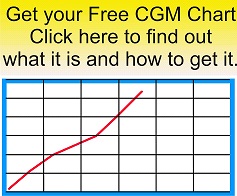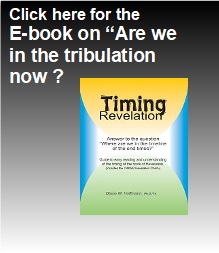Article from Timing Revelation and More,
"The Last Generation"
Is this generation the last before the end of this era?
By Diane M. Hoffmann, B.Th., M.Th., PhD/Th., Ord./IAOG-Canada
Another article provided by Timing Revelation & more...
We're living in the last days. And it dawned on me the other day that the current generation is called Generation Z.
How did that happen that at a time when we all know we are in the end times, there “happens” to be a current generation that is named by the last letter of the alphabet. I just had to set out to do a research for whatever I could find.
Some two thousand years ago, speaking of the end times to come in the future, Jesus, said that the generation that sees the budding of the nation of Israel will see the end. Let's take a look:
Matthew 24:34, “Verily I say unto you, This generation shall not pass, till all these things be fulfilled.”

How long is a generation?
The original word for generation here is the Greek word “genea“ (Strong's G1074), (pronounced ghen-eh-ah') – from a presumed derivative of G1085; a generation; by implication, an age (the period or the persons):—age, generation, nation, time.
This word genea in the King James Bible is translated into the English word “generation” thirty-seven times, and twice it is translated into the English word “time”, and “twice” into “age”, and once into “nation”.
Thayer's Greek Lexicon says this about it, “...among other : 1. a begetting, birth, nativity: Herodotus 3, 33; Xenophon, Cyril 1, 2, 8, etc.; [others make the collective sense the primary significance, see Curtius as above].
2. passively, that which has been begotten, men of the same stock, a family;
a. properly, as early as Homer; equivalent to מִשְׁפָּחַה, Genesis 31:3, etc. σῴζειν Ῥαχάβην κ. τὴν γενεὰν αὐτῆς, Josephus, Antiquities 5, 1, 5. the several ranks in a natural descent, the successive members of a genealogy: Matthew 1:17, (ἑβδόμη γενεὰ οὗτός ἐστιν ἀπὸ τοῦ πρώτου, Philo, vit. Moys. i. § 2). 3. the whole multitude of men living at the same time: 4. an age (i. e. the time ordinarily occupied by each successive generation)... “ etc.
There's a lot more yet, but this is enough to show that “a generation” can be understood to be more than one limited generation as we know it.
For example, we think of this generation that we live in here and now in 2023 as one nearing the end of its time, also being 75 years after the rebirth of Israel. We equate it as being a sign of the very end of the generation Jesus talked about.
But what is a generation? Some say 40 years, some say 70, some 100, some say 35! For example when in the Wilderness, those who crossed over to the promised land were considered a generation of 40 years.
Generations from Abraham to Christ
Matthew 1:17 says, “So all the generations from Abraham to David are fourteen generations; and from David until the carrying away into Babylon are fourteen generations; and from the carrying away into Babylon unto Christ are fourteen generations.”
If we look at that closely, the timing of the years between each of the generation mentioned in this scripture, it really does not fit any of the narratives. However a close examination of this scripture, taking into the equation the analysis of Matthew, reveals that the “fourteen” generations quoted by the writer are generational groups. In this case, groups of people living in particular periods of historical Jewish times.
For example, in the Liberty Bible Commentary it says this, “Fourteen generations is the literary groupings used by Matthew to emphasize the three major periods of Israel's national history: theocracy, monarchy, hierarchy.” So in this case we can calculate what these generations were: 65, 30 and 41 respectfully according to the periodical years.
In the same way, generations vary in their meaning by the substance of their identifying groupings within variable existential periods of time, history, families, cohorts, groups, etc., depending on the subject matter and topic of discussion.
Times, ages and nation
Then we have the words times, ages and nation, translated from the same word “genea“.
“Who in times (genea) past suffered all nations to walk in their own ways.” (Acts 14:16)
(In this scripture the word “nation: is not “genea” but it is “ethnos”, which is different from the scripture of Phl. 2:15 below).
“For Moses of old time (genea) hath in every city them that preach him, being read in the synagogues every sabbath day.” (Acts 15:21). Here it speaks of a long span of time.
“Which in other ages (genea) was not made known unto the sons of men, as it is now revealed unto his holy apostles and prophets by the Spirit;” (Eph. 3:5). Again a long span of time is spoken of.
“Unto him be glory in the church by Christ Jesus throughout all ages (genea), world without end. Amen.” (Eph. 3:21).
“That ye may be blameless and harmless, the sons of God, without rebuke, in the midst of a crooked and perverse nation (genea), among whom ye shine as lights in the world.” (Phl.2:15).
So, importantly, in these scriptures, the context determines the interpretation.
Our own personal family generations
When it comes to our own personal family generations, it is commonly said that a generation would refer to all the people born and living collectively around the same time.
But does that mean all the parents of my personal generation from their births to their deaths, and then separately my own generation from our births to our deaths, etc... of course not totally, there is an overlap. Some of our parents generation are still alive as we, their children have been growing up to this time, and the same with their parents in their own generation, and so on.
In other words, the personal generation of individuals now living in their seventies are living along with the people living in the latter years of their generation, and the early years of the people living in the next generation. So all of us are living in a time in our lives in the mid-point of the latter time of the previous generation and the early time of the next generation. The span would be variant of the current generational life expectancy.
In the book of Numbers in the Bible, we read that forty years of wandering in the wilderness had brought Israel to stand upon a mountaintop overlooking the land of promise. Every Israelite who were over twenty years of age when they had left Egypt under Moses' leadership was now dead -- except for three people: Moses, Joshua, and Caleb (Numbers 14:38).
But that generation is the one who entered into the promised land – except of course Moses, for God did not allow him to get into the land (Deuteronomy 32:52). So, that generation was 40 years.
A generation in our time, according to some reports, can also be described as, "the average period, generally considered to be about 20–30 years, during which children are born and grow up, become adults, and begin to have children." However I find this to be quite impractically limited. Plus it is not commonly accepted.
As we saw earlier, generations can have quite a variable extent according to the various groups.
Our present day generations
Right now let's take a look at our present day generations which is what got me into wanting to write this article, because of our current popular Generation Z that “happens” to be named with the last letter of the alphabet, at the time we know to be the end times.
Since we're living in the last days, I found it interesting that the current generation of young people is named after the last letter of our alphabet. Generation Z. How did that happen? Is it just a fluke of the times? Or is it another Bible prophecy coming to pass?
Let's look at our current living generations...
1)_The Great Generation, born 1901--1924 (named after the “great” world war 1).
2)_The Silent Generation, born 1925--1945 (named for working hard rather than fight).
3)_The Baby Boomer Generation, born 1946--1964 (named after the unprecedented post-war spike in birth rates.
4)_Generation X, born 1965--1979 (named after an influential popular culture X symbol).
5)_Millennials (also known as Generation Y), born 1980--1994 (named because they became adults around the millennium of 2000).
6)_Generation Z, born 1995--2012 (named simply to continue the sequence after Y).
7)_Generation Alpha, born 2013--2025 (again to continue the sequence after Z; known to be the first to be born entirely in the 21st century).
(Isn't it interesting also that these listed generations total 7... the biblical number of completion? Just saying.)
Following this current pattern, the next Generation will be Generation Beta with the people who will be born between 2025 to 2039.
As we can see here, the context is quite specific of people immediate of our current life time.
Let's pick up from Generation Z named after the last letter of our alphabet, and being the largest group in the U.S., surpassing the earlier powerful Baby Boomers.
Generation Z
As I began researching various sources, I also found many things I did not know about this Generation Z. What is Generation Z?
In reports of both the U.S. and Canada statistics, and the Pew Research, Generation Z is described as "the youngest generation with adult members", born between 1997 to 2013.
The reason why I underlined “with adult members” is because following Generation Z is the newest generation called Generation Alpha, which includes the children born in or after 2010, the oldest then being 13 at this time.
End of one era, beginning of another
Interestingly I find this also intriguing, being the first letter “A” of the next set of the alphabet following the last “Z”. Again is that coincidence or part of prophecy? In other words, looking at this from a prophetic sign of the end times we live in today, Generation Z could be the one to see the end of this era, and Generation A the beginning of the next – i.e., the new millennium spoken of in the book of Revelation?
Generation Z is the generational cohort that came after the Millennials. It is said to be the largest in our immediate history for America at 27% of the population, and Canada at 21%.
Born between 1995 and 2012, generation Z is also referred to as 'Gen Z', 'Snowflakes' and 'Zoomers'. The latter term according to Pew Research would be people born after 1996 whose oldest would now be 27 years old.
Rightly or wrongly this generation is given 5 characteristics by experts in the field:
They are:
Diversified from the norm,
Our First “Digital Natives”,
Pragmatic and Financially Minded,
Mentally Challenged,
Shrewd Consumers,
Politically Progressive — Even Those on the Right.
There is also a list of negative traits that is statistically given to them which I am not repeating here. But sadly though, a news video report was produced not long ago by CBS that goes into some of these issues, showing how confused many of them are over personal identities which reflects negatively throughout their schooling, families and their very livelihood and lives.
Gen Z is the new generation succeeding Millennials and proceeding towards generation Alpha which is the current younger cohort.
About the Millennial generation, it is also known as Generation Y, the Millennial generation precedes Gen Z and is defined as being born between 1981 and 1996. Its oldest members would be 42 at the time of this writing.
This generation is made up of a demographic age group who became adults around the time of what is called the millennium of the year 2000.
In 2021 this generation was considered to be the largest group in the U.S., with an estimated population of around 72 million, surpassing the earlier Baby Boomers generation count. They are currently a major part of the population and will continue to be for many years.
These two latest current generational cohorts are the most critical generations of our time.
Full circle to the end time issue
So, again, let's look at the scripture that relates to the generation in question, Matthew 24:34, “Verily I say unto you, This generation shall not pass, till all these things be fulfilled.”
It is obvious that the context of the generational reference spoken of by Jesus was a time in the future when a generation will see the Jewish people become a nation again. And that happened in 1948.
Who is that generation? It is that of the last cohort of contemporary people of that time. And the time span since then is now 75 years.
If we count the years from the Boomers generation (from 1946 to 1964) to Generation Alpha (2013 to 2025), as we saw above, we get exactly 75 years. Two years difference to Alpha's 2025.
Turning full circle to the reason that led me to write this article, the question was about the mystery of the name of the last current generation being called by the last letter of our English alphabet “Z”.
If the timing of the end times is as we see it, we actually notice that Gen Z falls within the view of the end of this age and Gen Alpha within the view of the beginning of the next millennium. Isn't that interesting?
Is it coincidence or is it prophetic confirmation? Time will tell.
/DMH
Click here or on the graphic
or




